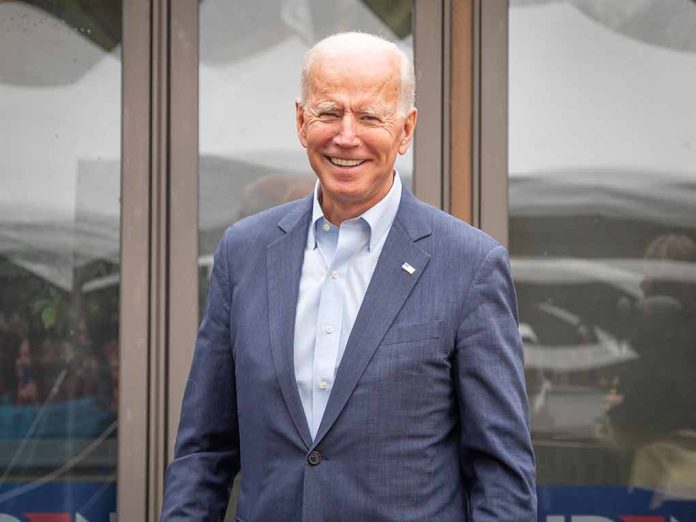
The Biden administration’s parole programs have allowed over 1.3 million migrants to enter the U.S., raising concerns about immigration enforcement capabilities.
At a Glance
- Over 1 million people have entered the U.S. under Biden administration’s parole programs.
- Programs target migrants from Cuba, Haiti, Nicaragua, and Venezuela.
- Parole allows temporary stay and work permits without permanent legal status.
- Critics argue the administration is abusing parole authority.
- Concerns arise over ICE’s ability to monitor paroled individuals.
Biden’s Expansive Use of Parole Authority
The Biden administration has implemented parole programs that have enabled more than 1.3 million migrants to enter the United States. These programs, aimed at providing a regulated and legal alternative to unauthorized border entries, have sparked intense debate over the use of immigration parole authority.
The administration has used parole extensively to admit migrants fleeing conflicts and crises in Afghanistan, Ukraine, Haiti, and Venezuela. This approach allows migrants to live and work in the U.S. temporarily without granting permanent legal status. However, Republican lawmakers accuse the administration of abusing parole and seek to restrict its use.
NEW: Per newly released CBP data, nearly 530,000 migrants have flown into the US & have been paroled into the country as part of the Biden administration’s controversial CHNV mass parole program. Additionally, approx 813,000 migrants have scheduled appointments via the CBP One…
— Bill Melugin (@BillMelugin_) September 16, 2024
Scope and Impact of Parole Programs
Internal data reveals significant numbers of migrants admitted through various parole programs. This includes 422,000 migrants using the CBP One app at the U.S.-Mexico border, 340,000 Haitians, Cubans, Nicaraguans, and Venezuelans through a sponsorship program, 176,000 Ukrainians under the Uniting for Ukraine program, and 77,000 Afghans resettled after the Taliban takeover.
“As a result of these efforts, hundreds of thousands of noncitizens have followed lawful pathways and orderly processes instead of crossing illegally between ports of entry,” – Luis Miranda, Department of Homeland Security spokesman
The administration argues that these programs are part of a “balanced approach” to address emergencies and reduce illegal border crossings. However, critics contend that this extensive use of parole authority circumvents established immigration laws and could lead to a potential legal limbo for paroled migrants if new laws are not enacted.
Challenges and Controversies
The implementation of these parole programs has not been without challenges. ICE faces considerable difficulties due to the lack of resources necessary to monitor and manage individuals who overstay their parole. This has raised concerns about the effectiveness and sustainability of current immigration enforcement policies.
Legal challenges to parole programs are ongoing, including a pending federal court decision on the sponsorship program for migrants from Cuba, Haiti, Nicaragua, and Venezuela. Additionally, Republican presidential candidates have signaled intentions to end Biden’s parole programs if elected, further complicating the long-term prospects for these initiatives.
Future Implications
As debates over immigration policy continue, the fate of these parole programs remains uncertain. Negotiations in Congress include proposals to cap parole grants and bar paroled migrants from seeking asylum. The potential for new legislation or policy changes following the next election cycle could significantly alter the landscape of U.S. immigration enforcement and the status of millions of paroled individuals.
The Biden administration’s use of parole authority has undoubtedly reshaped the approach to managing migration flows. However, the long-term implications of these programs on U.S. immigration policy, border security, and the lives of paroled migrants remain to be seen. As the debate continues, finding a balance between humanitarian concerns and effective immigration enforcement will be crucial for addressing this complex and contentious issue.
Sources:
- Biden administration has admitted more than 1 million migrants into U.S. under parole policy Congress is considering restricting
- The Biden Administration’s Humanitarian Parole Program for Cubans, Haitians, Nicaraguans, and Venezuelans: An Overview
- THE BIDEN BORDER CRISIS: NEW DATA AND TESTIMONY SHOW HOW THE BIDEN ADMINISTRATION OPENED THE SOUTHWEST BORDER AND ABANDONED INTERIOR ENFORCEMENT
- Trump vs. Biden on immigration: 12 charts comparing U.S. border security
- Attorney General Ken Paxton Sues Biden Administration Over Unlawful “Parole in Place” Policy that Incentivizes and Rewards Illegal Immigration
- STARTLING STATS: Biden’s Mass-Parole, Catch-And-Release Agenda Continues to Fuel Historic Border Crisis, Endanger Americans









